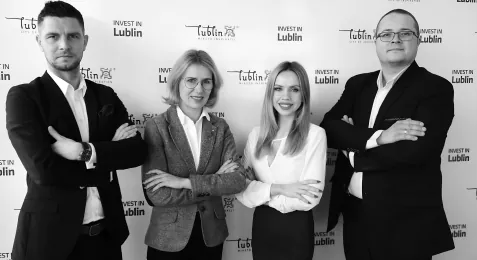Lublin Info Centre
How modern technology is shaping tax and legal advisory – Interview with Grażyna Sadowska-Malczewska, CEO of PKF BPO

PKF Polska began operating in Lublin three years ago. How do you assess this period? What changes have you observed in economic development and cooperation with local businesses?
These three years have been a great success for us. The Lublin market has demonstrated its dynamism, openness, and potential.. The data tells a compelling story: unemployment has dropped by 2.8 percentage points, wages have increased by nearly 13%, and industrial sales in the region have grown by 4.4%, compared to just 0.3% nationally. This clearly demonstrates the region’s growing economic strength.
The city is evolving rapidly, with major investments such as the new Lublin Railway Station and the opening of a regional office for the Polish Investment and Trade Agency. These developments show that Lublin is attracting both domestic and international investors, particularly from Germany and the United Kingdom.
Scientific and cultural advancements are also playing a key role. Being named the European Capital of Culture for 2029 presents a significant opportunity for the city—not only in terms of prestige but also in terms of economic growth. These factors create a better environment for the expansion of professional services such as auditing, outsourcing, and consultancy, which we offer at PKF Polska.
PKF has been in the market for 30 years. How have clients’ expectations and needs changed over this time?
The past three decades have been transformative for our industry, driven by technological advancements and regulatory changes. A decade ago, digital tools were still a novelty; today, they are essential. The COVID-19 pandemic accelerated digitalisation, making technology a daily necessity even for those who were once sceptical.
Automation, robotics, and AI now allow us to process vast amounts of data, speed up task completion, and focus on delivering insightful business analysis and recommendations.
At the same time, we are experiencing an unprecedented level of regulatory change—over 27,000 pages of new legislation were introduced in 2022 alone. This complexity has led more businesses to outsource their accounting and payroll functions to specialists.
Auditing has also evolved. It is no longer just about verifying financial figures; today, it involves evaluating business models, processes, and risk management Today, our clients range from company executives to investors, lenders, and regulators.
Looking ahead, we expect even greater integration of technology and AI, new reporting requirements—such as sustainability disclosures—and even higher expectations of our role as business advisors.
How have companies’ attitudes towards tax and legal advisory services changed? How does PKF Polska respond to these trends?
We have observed a major shift—companies now see tax planning as a strategic tool rather than just a legal obligation. Tax advisory services have become an integral part of decision-making, with tax advisors playing a key role in structuring transactions, implementing business reorganisations, and optimising tax implications.
Recent years have brought major legislative changes, often of questionable quality—examples include the implementation of the Estonian CIT model and the middle-class tax relief scheme. At PKF, we proactively adapt to these changes by continuously updating our expertise and educating our clients.
However, some businesses, particularly SMEs, try to cut costs by forgoing tax advisory services, assuming they won’t be audited or delegating tax matters entirely to accounting firms. From experience, we know this approach carries significant risks. Just as medicine requires specialists, so does tax compliance. Effective tax management requires close cooperation between accountants and tax advisors.
Access to tax information has increased, but as our experts stress, knowing the law is not the same as correctly applying it to specific cases. This is where tax advisors play a crucial role.
How does PKF Polska use digitalisation and new technologies to stay competitive? What solutions are you implementing, and how do you support employees through this transformation?
New technologies have revolutionised the way we deliver services. Across all business lines, we have dedicated teams working on innovation. We use Data & Analytics tools, AI-driven systems, secure document exchange platforms, and handle electronic reporting for JPK and KSeF.
In outsourcing, we customise financial, accounting, HR, and document management systems to meet our clients’ needs. This enables efficient data integration with business tools, allowing our clients to access relevant management insights quickly.
We also invest heavily in skills development, offering training and modern tools that free employees from repetitive tasks, allowing them to focus on higher-value activities.
How does PKF Polska ensure cybersecurity? What are the most pressing challenges in this area today?
Cybersecurity is one of the biggest challenges facing businesses today. The number of incidents is rising dramatically—there were 36,000 in 2022, and by September 2024, that number had already exceeded 100,000.
At PKF, we have implemented a strict information security policy. We follow the principle of minimal access, encrypt data, and use two-factor authentication. We also conduct regular risk assessments and provide ongoing cybersecurity training for all employees.
Our systems are protected by advanced Endpoint Detection and Response (EDR) solutions, and our audit environments are kept separate from other systems to minimise risk. We are also closely monitoring new regulations such as NIS2, DORA, and the AI Act, ensuring we are fully prepared for their implementation.
PKF Polska recently moved to the new Orion building. What does this change mean for the company and its employees?
Relocating to Spokojna Street is a significant step forward. Employees appreciate the new location and improved working environment. A modern office is also a key factor in attracting new talent—we have already expanded our team in the new space and plan further growth.
How important is collaboration with universities in Lublin and the involvement of young talent?
Lublin is a hub of young talent. We work closely with universities and have noticed that students are becoming more selective when choosing internships and jobs.. They prioritise development opportunities, meaningful work, and a positive work environment—all of which we provide.
We encourage students to take initiative and gain experience while still studying. At PKF, they can explore different industries and develop skills using cutting-edge technologies. Rather than offering ready-made solutions, we teach them to think independently.
What are PKF Polska’s current recruitment needs in Lublin and the surrounding area?
Our growth plans are ambitious—we aim to double our workforce in Lublin within three years. The fastest-growing teams are in outsourcing, auditing, and consulting. We are also expanding our tax advisory services and considering launching new divisions in legal advisory, cybersecurity, HR, and ESG.
What skills do you look for in candidates? Are there preferred fields of study?
We seek candidates with a solid foundation in finance, law, accounting, or taxation, but just as important are adaptability, a willingness to learn, and strong teamwork skills.
PKF operates as a decentralized network with offices in nine cities and is part of an international organization. Strong communication skills, the ability to work in teams, and flexibility in adapting to change are essential.
What are PKF Polska’s future development plans? Are there any new services in the pipeline?
Our expansion strategy is broad—both in terms of geography and services. We are strengthening all our branches, including Lublin. In outsourcing, we plan to introduce tailored services for micro-businesses. In consulting, we are enhancing our M&A support. Meanwhile, we continue to develop our expertise in cybersecurity, ESG, and legal advisory services.
Our goal is to remain among Poland’s leading audit and consulting firms—fully prepared for evolving market and technological challenges.






